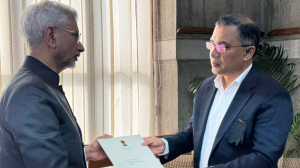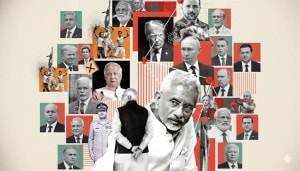Think like the enemy
With the war in Kargil over bar the usual shelling, it is time for politics to take over. The BJP is never one to miss out on an opportun...

With the war in Kargil over bar the usual shelling, it is time for politics to take over. The BJP is never one to miss out on an opportunity for drum-beating. From threatening to scatter the radioactive sands of Pokharan around the country, to hauling the Lahore bus onto the Hauz Khas Village stage in Delhi at their government8217;s first anniversary celebrations, to now making the Prime Minister pose with cardboard-mounted enlargements of multi-barrel rocket launchers in full cry at Kargil, the party has been entirely consistent with its style of turning the most serious security issues into tamasha.
But now, with the warlike situation8217; hopefully behind us, even the Congress is not to be left behind. Its youth wing, after burning copies of Arundhati Roy8217;s book in Gujarat in protest against her anti-Narmada Dam campaign, is now threatening to burn the bus to Lahore. The real danger in all this is not mere politicisation of the Kargil issue, it is the trivialisation of one of the gravest crises of ourtimes. The danger is that between the BJP8217;s celebrations of victory, its self-serving strategy of using the Army as a shield against any charges of political failure and the Congress Party8217;s skulduggery, the real issues will be lost.
That is why it is important to pause and look at the post-war balance sheet. While we celebrate our military and diplomatic victory it is also vital that we look at the costs it has entailed 8212; besides the casualties to our soldiers 8212; and the gains our rivals may have made in the bargain. For the past few weeks we have celebrated Pakistan8217;s isolation and embarrassment, the retreat, even if negotiated, of its forces, of the utter failure of its Kargil misadventure. But if we look closely and dispassionately enough, Pakistan has also made some gains on tactical, strategic and diplomatic fronts. It does sound sacrilegious to say this when we are in such a jubilant mood. But it is in understanding this, in having the foresight to think like the enemy and speak for him, even if fora moment, that the prospect of building long-term gains from Kargil lie for us.
All of us know quite well what Pakistan has not just lost face in Kargil. It is also quite well documented in the Pakistani media, which is as reluctant as we are to believe that that country made any gains from this misadventure at all. It is also reflective of the bankruptcy of the Pakistani military mind that their official spokesmen, instead of looking at the military/diplomatic scoresheet more shrewdly, are only tom-tomming fantastic claims of still holding crucial heights.
It is amazing how they never talk about their greatest tactical gain of all, of having Siachenised the entire mountain wasteland between Zojila and Turtuk, tying down at least two Indian mountain divisions and leaving us with no option but to maintain such a large body of troops 8212; and masses of artillery 8212; through the winter after the passes close. What this has done, besides raising the costs of defending Kashmir for us, is to affect our entireclassical military posture vis-a-vis Pakistan. In the short run, by forcing us to commit such reserves in a defensive role, it has curtailed our riposte capability within Kashmir. Also, if you look at the big picture, it has given a more defensive tilt to our military doctrine and mindset in Kashmir. Besides, it has forced us to move Army units out of the Valley, leaving it entirely in the hands of the paramilitary forces. It may not be a disaster, but it is a risk nevertheless and gives the Pakistanis a window of opportunity. Also, in our post-Kargil mood of shock and anger, we are bound to increase defence budgets, giving the Pakistanis the hope that the pace at which we had been gaining on them economically will slow down a bit. If there was one thing they watched in great awe during the past two months, besides the performance of our massed artillery, it was the resilience of the Indian economy. The Sensex here actually grew while its miserable Karachi cousin had 26 per cent of its value knockedout.
One reason we have made such diplomatic gains internationally is our patience in not hitting across the Line of Control while we were being bled in Kargil. It did require a great deal of patience, fortitude and good sense on the part of the Indian political and military leadership to sustain that self-denial. It can be compared, in a way, to how the Israelis took the Iraqi Scud strikes stoically without retaliating during the Gulf War. But having thus given the LoC the status of a Lakshman Rekha of sorts, haven8217;t we placed severe tactical limitations on us for the future 8212; and announced them to the world? Won8217;t the world now expect us to follow that principle as and when any or many?, more Kargils happen in future? The Pakistanis have probably not missed this nuance. The greater fear is, they may read too much into it and launch themselves into yet another misadventure.
At the diplomatic level, the Pakistanis have succeeded in internationalising the Kashmir issue. Their armies may have lost Kargilbut they have given the Americans a foothold in the subcontinent. On the surface, the strengthening Indo-US embrace and the spirit of Kargil spring in their relationship is a loss for Pakistan. But if Islamabad plays the game right from now on, it could turn into a mixed blessing for India, particularly with the UN General Assembly session coinciding with the Indian elections. Because they have so far looked at Kargil through a narrow and defeated military vision the Pakistanis may fail to see the opportunity here. But if they do, they could cause some discomfiture for whoever takes over in India in October. Kargil represents a watershed in India8217;s post-1971 approach to international interest and role in the subcontinent. It opens the subcontinent up to the world, bringing fresh threats and opportunities for both India and Pakistan.
These factors must not be overlooked in our euphoria over the military successes as we move beyond Kargil. Future negotiations with Pakistan as well as the US and other keyplayers must focus on more reliable guarantees on the sanctity of the LoC, on non-interference in the Valley and on future defence budgets and military build-up in general. Our soldiers have not only fought their way out of the great mess we dumped them in, they have also given us a diplomatic headstart and moral high ground internationally. To exploit this fully, we must assess carefully, and maturely, the way the picture looks from the Pakistani point of view. Mere celebrations of victory won8217;t do.
- 01
- 02
- 03
- 04
- 05































